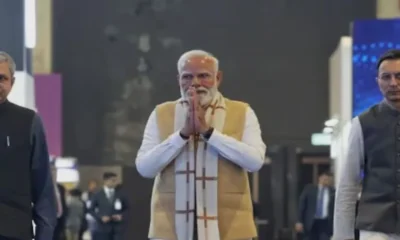[vc_row][vc_column][vc_column_text]PM Narendra Modi came to power in 2014 riding on popular anger against corruption whipped up by a full scale movement on the issue. He made it a major poll plank, famously declaring ‘Na khaunga, Na khaane doonga’ (will neither take bribes nor let anyone take bribes).
Four years later, reports by independent agencies depict Modi government’s record on this front as dismal. A CMS study, CMS-India Corruption Survey 2018, released a week ago, finds that 75 percent households have the perception that the level of corruption in public services has either increased or remained same during the last 12 months.
Earlier, India was reported to have slipped two ranks to be 81st in 180 countries in Transparency International’s (TI) ratings.
Worse, TI attributed to this an aspect that riles Modi government due to the flak its faces on it from all around: lack of press freedom. Perhaps that was also the reason few media organisations reported the CMS-ICS study key findings inconvenient to the government.
The CMS-ICS study also adds that perception about Union Government’s commitment to reduce corruption in public services has seen a decline from 41 percent in 2017 to 31 percent in this round (2018).
The study covered both rural and urban locations of 13 states (including six which are ruled by the BJP) and 11 public services.
The states were Andhra Pradesh, Karnataka, Tamil Nadu, Telangana, Bihar, Madhya Pradesh, Uttar Pradesh, West Bengal, Delhi, Punjab, Rajasthan, Maharashtra and Gujarat.
The public services which have been availed between 2005 and 2018 are: Public Distribution System (PDS), Health/ Hospital, School Education, Electricity, Water Supply, Housing/ Land Records, Police, Banking Services and Judiciary, plus MGNREGS for rural locations.
“While 38 percent of the households across India feel that the level of corruption has increased, another 37 percent households feel that the level of corruption in public services has remained same as before,” says the report.
“States where nearly half of the households perceived that the level of corruption has increased during the last one year include Andhra Pradesh, Punjab, Tamil Nadu Rajasthan and Gujarat,” the report says.
It says less than half of the households in states such as Bihar and West Bengal, believed that the level of corruption in public services has decreased during the last one year prior to the survey.
In states like, Telangana, Karnataka, Maharashtra, Gujarat, Tamil Nadu, Delhi and Uttar Pradesh, nearly 40 percent or more feel that the level of corruption has remained same during the last one year prior to the survey conducted for CMS-ICS 2018.
The CMS report has some good news, as well. Based on a survey conducted in both rural and urban areas across 13 states, the CMS-ICS 2018 has found that the proportion of households experiencing corruption while availing any of the nine public services has almost halved – from 52 percent in 2005 to 27 percent in 2018.
In the last 13 years, the proportion of households (rural and urban combined) experiencing corruption pertaining to Police, Housing/ Land Records and Judicial services has reduced by more than 50 percentage points, according to the CMS-ICS report.
The proportion of households experiencing corruption in 2018 is the highest for Transport (21 percent), followed by Police (20 percent) and Housing/ Land Records (16 percent).
Although the proportion of households experiencing corruption in 2018 is the lowest for availing Banking services (1 percent), the highest bribe which an average Indian household has paid in 2018 is for taking loans from a bank (viz. Rs. 5250/- on an average in a year).
For getting a new driving license or renewing a driving license, an average household has paid a bribe of Rs. 518 in a year.
In 2018, roughly 1.9 percent households (rural and urban combined) were denied public services like Police or PDS either because of not paying bribes or because of not having contacts/ middlemen to take forward their requests. Nearly, 1.4 percent rural households were denied MGNREGA benefits for the same reasons.[/vc_column_text][vc_column_text css=”.vc_custom_1526985551161{padding-top: 10px !important;padding-right: 10px !important;padding-bottom: 10px !important;padding-left: 10px !important;background-color: #dd9933 !important;border-radius: 10px !important;}”]
- Among states, 73 percent households in Telangana, 38 percent in Tamil Nadu, 36 percent in Karnataka, 35 percent in Bihar, 29 percent in Delhi, 23 percent in Madhya Pradesh; 22 percent in Punjab and 20 percent households in Rajasthan experienced demand for bribe or had to use contacts/middlemen, to access the public services.
- Among public services, where households experiencing corruption while availing its services was high during the last 12 months include, Transport (21 percent), Police (20 percent), Housing/ land records (16 percent) and Health/ hospital services (10 percent). Less than one percent of the households experienced corruption in banking services.
- While 99 percent of the respondents had Aadhaar but 7 percent of them paid bribe to get it. In case of Voter ID, around 92 percent had one but 3 percent paid bribe to get the Voter ID made. This is high and reflects continued malice.
- Perception about Union Government’s commitment to reduce corruption in public services has seen a decline from 41 percent in 2017 to 31 percent in this round (2018).
- Grouping of States by People’s Perception and Experience with Corruption while availing Public Services put Tamil Nadu, Punjab, Telangana, Andhra Pradesh, Gujarat and Rajasthan among the ‘poor performing’ while West Bengal, Maharashtra, Madhya Pradesh, Uttar Pradesh and Bihar among the ‘better performing’ states.
- States’ position on the basis of Citizen Activism-Use of RTI; online complaint registering; participation in public protest rally against corruption; Use of Digital payment gateway, having Aadhaar- Maharashtra, Delhi, Gujarat, Bihar and Telangana among ‘better performing’ states and states namely, Andhra Pradesh, West Bengal, Karnataka, Uttar Pradesh and Madhya Pradesh, among ‘poor performing’.
[/vc_column_text][/vc_column][/vc_row]





















